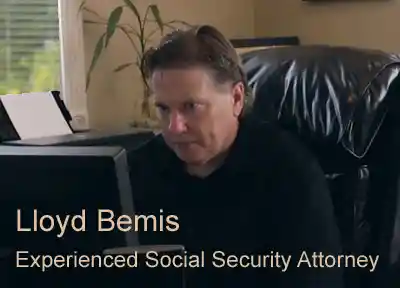Can I get disability benefits if I am suffering from the effects of Psychosis?
You could possibly get disability benefits for Psychosis, there are many factors involved.
Author Attorney Lloyd Bemis:

If you are suffering from Psychosis you may qualify for disability benefits, if you have been denied benefits you should consider appealing the decision. Call 512-454-4000 and talk to a dedicated disability lawyer today
Psychosis is recognized as an impairment in Social Security’s Blue Book under Section 12.03, a listing that includes schizophrenia spectrum and other psychotic disorders. Schizophrenia is the most common disorder in this category, but other mental disorders are included in this listing, such as schizoaffective disorder, delusional disorder, brief psychotic disorder and substance induced psychosis.
Approximately three out of 100 people will have a psychotic episode at some point in their lives, though actually less than one percent of people in the United States suffer from a psychotic disorder.
Psychosis is a condition where a person loses touch with reality and experiences the world differently from other people. It can be a one-time experience or linked to other conditions and usually affects people for the first time in their late teens or early adulthood.
Other symptoms of early psychosis include:
- Hearing, seeing, or tasting things other people don’t;
- Inability to pay attention or think clearly;
- Inability to understand new information;
- Memory problems;
- Distancing oneself from family and friends;
- Difficulty making decisions; and
- Neglecting personal care.
These or a combination of these symptoms can cause you to miss work and jeopardize your ability to maintain employment.
Contact a Social Security disability attorney at 512-454-4000 for a free consultation and see if you can get disability benefits while suffering from a form of psychosis. If you have been denied disability don’t give up!
Qualifying for Disability Benefits for Psychosis
Psychosis is recognized as an impairment in Social Security’s Blue Book under Section 12.03, a listing that includes schizophrenia spectrum and other psychotic disorders.
Schizophrenia is the most common disorder in this category, but other mental disorders are included in this listing, such as schizoaffective disorder, delusional disorder, brief psychotic disorder and substance induced psychosis. To qualify for SSDI you must be able to provide medical documentation of a psychotic disorder that has existed for at least two years. You must also show that your condition limits your ability to function in a work environment so severely that you are unable to work.
To be eligible for SSDI under a diagnosis of psychosis, you must provide:
- Medical documentation of one or more of the following:
- Delusions or hallucinations; or
- Disorganized thinking (speech); or
- Grossly disorganized behavior or catatonia.
- Extreme limitation of one, or marked limitation of two, of the following areas of mental functioning. Social Security defines “marked” as less than extreme, but worse than moderate.
- Understanding, remembering, or applying information. For example, being able to understand instructions and learn new skills.
- Interacting with others in a socially appropriate manner.
- Concentrating, persisting, or maintaining pace; the ability to complete tasks.
- Adapting or managing oneself. Understanding acceptable work performance, being aware of safety hazards, wearing appropriate attire, and maintaining personal hygiene.
- Evidence that your mental disorder is “serious and persistent. This means you have a medically documented history of the existence of the disorder over a period of at least 2 years,
- You are receiving medical treatment, mental health therapy, psychosocial support(s), or you are living in a highly structured setting which diminishes the symptoms and signs of your mental disorder; and
- You have minimal ability to adapt to changes in your environment or to demands that are not already part of your daily life.
AND
OR
AND:

Most initial claims for benefits are denied. If you would like help applying for benefits or appealing a denied claim contact us today for a free consultation. Call 512-454-4000 and get help NOW.
Social Security acknowledges that there are some people who do not meet the criteria of the listing because they live in a supervised situation, such as a hospital or nursing home, where their functional limitations appear better than if they lived on their own where the stress of daily life would be greater.
Social Security is more interested in a person’s functional limitations than a specific psychotic diagnosis.
An applicant must be able to prove they can’t work even though they are following treatment. Some applicants who suffer from psychosis and do not meet the requirements of the listing are still unable to hold any job. These applicants may not exhibit the stereotyped symptoms of psychosis, such as hearing voices, but they are unable to maintain organized thought patterns or have difficulty with social interactions. If an applicant can prove that their impairment is ongoing and is so severe it prevents them from performing even unskilled labor, they may qualify for SSDI on the basis of a medical-vocational allowance.
Applicants who suffer from a complex mental disorder like psychosis should consult an experienced disability attorney.
Because a person with psychosis frequently experiences difficulty with concentration, memory, and dysfunctional thought patterns, they may not be capable of representing themselves. A qualified disability lawyer can obtain medical records and physician statements and manage appeals and hearings, making a positive result much more likely.
In order to qualify for Social Security Disability, you will need to satisfy a few specific requirements in two categories as determined by the Social Security Administration.
The first category is the Work Requirements which has two tests.
- The Duration of Work test. Whether you have worked long enough to be covered under SSDI.
- The Current Work Test. Whether you worked recently enough for the work to actually count toward coverage.
The second category is the Medical Eligibility Requirement.
- Are you working? Your disability must be “total”.
- Is your medical condition severe? Your disability must be “severe” enough to interfere with your ability to perform basic work-related activities, such as walking, sitting, and remembering.
- Is your medical condition on the List of Impairments? The SSA has a “List of Impairments” that automatically qualify as “severe” disabilities. If your disease is not listed this does not mean you cannot get disability, it means you must prove you cannot maintain employment due to your limitations.
- Can you do the work you did before? SSDI rules look at whether your medical condition prevents you from doing the work you did prior to developing the condition.
- Can you do any other type of work? If you cannot do your prior work, an evaluation is made as to whether you can perform any other kind of work.
More details can be found on our Qualifying for Disability page.
Disability benefits are an important source of income for those who are unable to work. If you are not able to work due to accident or illness, you may be eligible for Social Security Disability or Long Term Disability benefits. If you have applied for benefits and been denied, contact the attorneys at Bemis, Roach and Reed for a free consultation. Call 512-454-4000 and get help NOW.
Dementia and qualifying for Social Security Disability Benefits
Memory Disorders Disability Attorneys
When is a Person Considered Disabled?

Your Free Initial Consultation
Call now:
At Bemis, Roach and Reed, if we can't help you, we will try to find the right attorneys for you.
We offer each of our prospective clients a free no obligation one hour phone or office consultation to see if we can help you and if you are comfortable with us. We know how difficult a time like this can be and how hard the decisions are. If we can be of assistance to you and help you find a solution to your issue we will even if that means referring you to another attorney.
Let's get you Started:
If you could provide us with some basic information about your claim we will get right back with you with a free case evaluation and schedule your Free Consultation Today.






